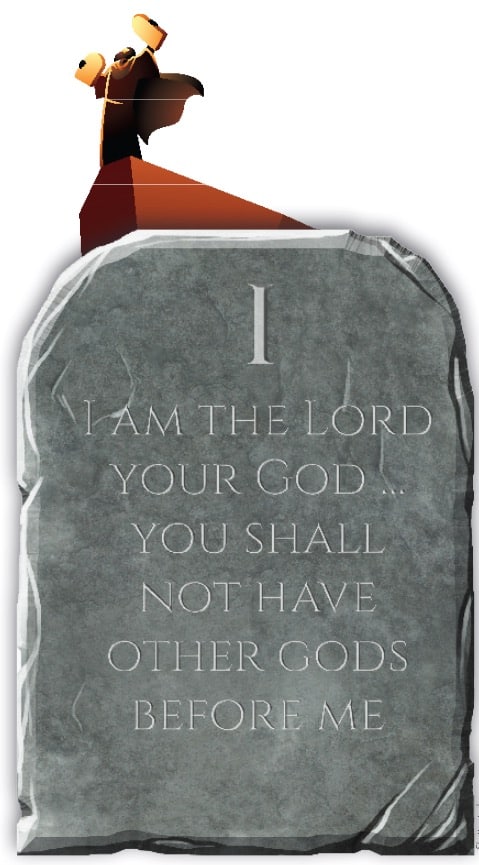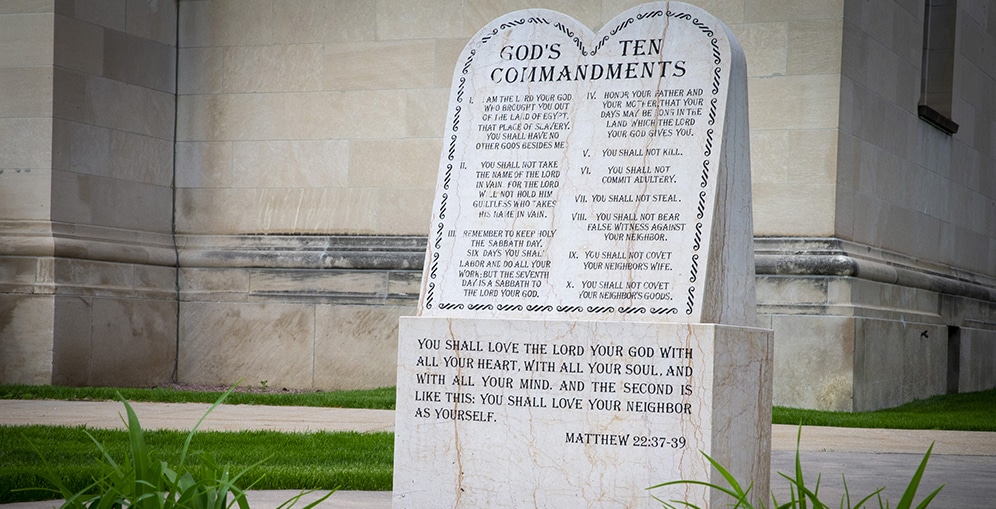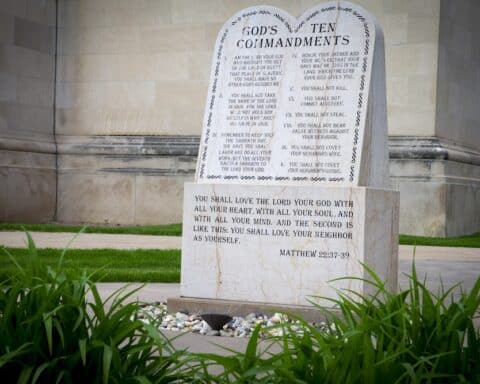This is the second installment of a 10-part series looking at the Ten Commandments.
We need the Law of the Lord because we do not know our own hearts, because our hearts have become confused and scattered and obscure. The Ten Commandments are mercy — a light — to those who are lost, who seek to be found and who are to be set free in the love of God and for the love of neighbor.

None of the commandments is merely about deeds to perform or deeds to avoid. All of them are also about redeeming our desires, guiding us on the way to wanting and enjoying the love of God and neighbor that is life in Christ. Rediscovering the beauty of God’s commandments and recommitting ourselves to their observance is a pathway to having our hearts rewritten so that we might bear the fruit of love.
This all begins with the First Commandment, the traditional catechetical formula for which is this:
“I am the Lord your God …
you shall not have other gods before me.”
This commandment is first because everything in the moral and spiritual life depends on this. It is both the fount and the foundation of the truly human life, which is made perfect as life in Christ.
First point about the First Commandment
There is something very peculiar, and very beautiful, that we should notice right from the start. This commandment — and therefore all the ones that follow — is not some mere rule or cosmic principle. It isn’t like a law of physics that, though true, is just there.
Listen again to what is said: “I am the Lord your God.” This is a personal address. This is a word spoken from someone to someone. We probably can’t wrap our imaginations around this astounding fact, that the Lord God, creator of all, speaks personally — with I-and-you language — to us. But here it is.
The First Commandment — all the commandments — are personal, and they are personalizing.
The “you” here, to whom God speaks, is his People Israel. Israel becomes a person because the Lord God speaks personally. All who share in the life of Israel hear this “I” addressed to them, personally.
And in Jesus, who fulfills the Law and the prophets — the whole history of Israel — this “I” of God is received fully into human flesh, and that “you” becomes Christ’s Church, so that all who share in the life of the Church hear this “I” addressed to them, personally.
This First Commandment sets the tone for all the commandments. The commandments are not just moral precepts, not just rules to be followed, not just commandments given distantly or aloofly. The commandments take the form of a personal address from a personal God to his people.
Second point about the First Commandment
The second point about the First Commandment requires us to really think about what a “god” is. For that, we should turn to the Book of Deuteronomy, Chapter 6, where we find the Shema. This became the traditional daily Jewish prayer, which a faithful Jew says at morning and at night. (See sidebar below for this text.)
What does the Shema say? It says that in the morning when you wake, at night when you sleep and all throughout the day, that there is one thing above all that you must remember. There is one thing above all that you must profess as true. There is one thing above all on which you must build all your life and all its activities. That one thing is simply this: The Lord is God and there is no other.
This is a deeply practical matter. This is the most important thing parents are to teach their young. This is what you recite wherever you go, near or far. It is true whether you are active or resting, busy or idle. It should be present in everything you produce. When someone looks at you or you look at yourself, this truth should be obvious. When you or others come and go from your house, you and they should know that this household is for the Lord.
In short, this is the basis of life. This one truth is rehearsed first of all and regularly. And when Jesus was asked what is the greatest commandment, he recited this (cf. Mt 22:36-38).
The Shema, however, does not just instruct us to call the Lord “God”; it also shows us what a “god” is. To grasp this, we should engage in a little exercise. Looking back at the Shema, take out the name “Israel” and put your own name in its place. Then take out the name “Lord” and leave that space blank. This opens up the opportunity for an examination of conscience. We might now ask: What do I really treat as most important in my life? This is not about what I say is most important, but instead about what I treat as most important. To what do I give the most attention? In what do I place my trust? On what do I build my life through my day-to-day actions?
Undertaking an exercise like this, we start to see what it means to call someone “God.” Joseph Ratzinger (Pope Benedict XVI) offers this really helpful definition of a “god.” He writes in “The God of Jesus Christ” (Ignatius Press, $15.95), “A god means that from which we are to expect every good and to which we are to take refuge in every distress, so that to have a god is nothing else than to trust and believe in him from the heart.”
Your “god” is not necessarily who you say your “god” is, day in and day out. It is really who you trust and rely on at the end of the day. It is who or what you set your heart on. It is who or what you run back to when all else fails.
Third point about the First Commandment
The third point and final point is that the first duty of the moral and spiritual life is to let God be God … your God. That is actually the beginning of our own sacrifice. A sacrifice is an act that makes holy, and a sacrifice always comes at a cost. To heed and follow the First Commandment is the beginning of our sacrifice in the moral and spiritual life.
When we accept and commit to the First Commandment, we ourselves say: “You alone are God. I am not God. Nothing besides you is God. I receive you.”
Remember, this commandment is a personal address. The Lord says to his people: I am God. The first duty for the people is to respond, “OK, you’re God.”
We see how this is a sacrifice because we can think about all the other things that, from time to time, it would be convenient or seemingly advantageous to treat as god. I might treat my own security as god, or my advancement, or my and my family’s health, or even just my own comfort. Likewise, it is tempting to pass on to my children, first of all, a chance at worldly success, or my own habits, or reverence for me.
The First Commandment instructs us to receive the Lord who speaks to us as God, and to avoid making our own gods.
| The Shema |
|---|
|
Hear, O Israel! The Lord is our God, the Lord alone! Therefore, you shall love the Lord, your God, with your whole heart, and with your whole being, and with your whole strength. Take to heart these words which I command you today. Keep repeating them to your children. Recite them when you are at home and when you are away, when you lie down and when you get up. Bind them on your arm as a sign and let them be as a pendant on your forehead. Write them on the doorposts of your houses and on your gates” (Dt 6:4-9).
|
This commandment is fulfilled in Christ, whose own sacrifice makes our sacrifices possible. As the Catechism of the Catholic Church teaches: “The only perfect sacrifice is the one that Christ offered on the cross as a total offering to the Father’s love and for our salvation. By uniting ourselves with his sacrifice we can make our lives a sacrifice to God” (No. 2100). Jesus, who shares equality with God the Father, does not grasp it. He receives the love of the Father all the way to the end. He does for us — in our flesh — what we must do. He says to the Father, “I receive you,” and he gives his whole life over. He does what the Shema prescribes.
Life in Christ is an integrated life. And the fount and foundation of that integration is the Word of God, whom we first hear. We must practice hearing him. We must practice hearing him daily, when we wake and when we sleep. We must practice hearing him in all our activity and at rest. We must pass on that discipline to our children.
That’s the First Commandment.
Leonard J. DeLorenzo, Ph.D., works in the McGrath Institute for Church Life and teaches theology at the University of Notre Dame. His new book is A God Who Questions (OSV, 2019).





